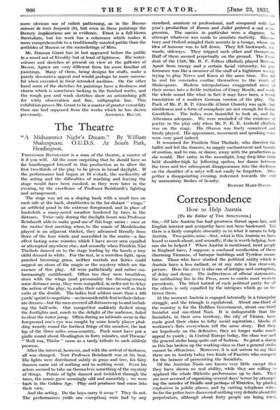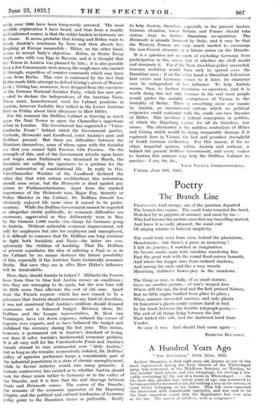Correspondence
How to Help Austria
[To the Editor of THE SPECTATOR.] SIR,—Of late Austria has had greatness thrust upon her, and English interest and sympathy have not been backward. Yet there is a fairly complete obscurity as to what it means to help Austria. Two points arise—first, what is this Austria we have heard so much about, and secondly, if she is worth helping, how can she be helped ? When Austria is mentioned, most people in England have, I suppose, a confused recollection of those charming Viennese, of baroque buildings and Tyrolese moun- tains. Those who have studied the political entity which is Austria have a less radiant, or at any rate a less clear-cut, picture. Here the story is also one of intrigue and corruption, of delay and decay. The indirectness of official statements, the unblushing lies in the Press, seem to outdo most western precedents. The blind hatred of each political party for all the others is only equalled by the intrigues which go on be-
tween them. - At the moment Austria is engaged internally in a triangular struggle, and the triangle is equilateral. About one-third of the country is for the Dollfuss Government, about one-third Socialist and one-third Nazi. It is indisputable that the Socialists, in their own territory, the city of Vienna, have made good their claim to lofty social aspiration ; blocks of workmen's fiats everywhere tell the same story. But they are hopelessly on the defensive, they no longer make much appeal to youth ; in Central Europe today, the class war and the general strike hang quite out of fashion. So great a slump as this has broken up the working-class so that a general strike cannot be efficacious. Moreover, it is not untrue to say that there are in Austria today two kinds of Fascists who compete for the honour of persecuting the Socialists.
Of the Austrian Nazis one knows very little except that they have shown no real ability, while they are willing to applaud the whole Hitlerite performance up to date. They are now accused of organizing several days' terror by attempt- ing the.murder of Steidle and-perhUps of Rintelen, by placing explosives in public places, and by cutting telephone wires. So far the police have discovered nothing very definite about the perpetrators, although about forty people are being tried,
while over 1000 have been temporarily arrested. The most credible 'explanation I have heard, and that from a usually well-informed source, is that the wilder leaders in Germany are to blame. It seems probable that Goring and Rohm want to break Austria's resistance by force and then absorb her, laughing at Europe meanwhile ; Hitler, on the other hand, seems to accept Italy's objection. Rohm, as Storm Troop chief, rules with von Epp in Bavaria, and it is thought that the Terror in Austria was planned by him ; 'it is also possible that a few Communists were among the rough men who carried it through, regardless of counter-commands which may have come from Berlin. This view is confirmed by the fact that Etler made little attempt to defend Goring's arrest of Wasser- Nick ; Goring has, moreover, been dropped from the executive of the German National Socialist Party, which has new pro- c-eded to declare the independence of the Austrian Nazis. These must, henceforward, work for Cabinet positions in Austria, however foolishly they talked in the Lower Austrian Diet on Friday about their allegiance to Herr Hitler.
For the moment the Dollfuss Cabinet is thriving as much upon the Nazi Terror as upon the Chancellor's opportune debut in London. The Government has organized a " Vater- Iiindische Front " behind which the Government parties, Clericals, Heimwehr and Landbund, extol Austria's past and Dollfuss' present. But there are difficulties between the Ministers themselves, some of whom agree with the Socialist cry that you cannot fight Fascism with Fascism. On the strength of this, and of the Government attacks upon hours and wages since Parliament was dismissed in March, the Socialists a're calling for signatures to a petition for the rapid restoration of constitutional life. In reply to this, Vice-Chancellor Winkler of the Landbund declared the other day that with certain modifications this restoration should soon occur, but the Heimwehr is dead against any return to Parliamentarianism. Apart from the marked importance of the Heimwehr man, Major Fey, Security or Police Minister in the Cabinet, Dr. Dollfuss himself has obviously enjoyed life more since it ceased to be parlia- mentary. While the Dollfuss Government cannot be regarded as altogether stable politically, its economic difficulties are enormous, aggravated as they deliberately were in May • by the German 1,000 marks visa charge for Germans going to Austria. Without noticeable economic improvement, not only for employers but also for employees and unemployed, it is difficult to conceive that Dr. Dollfuss can long continue to fight both Socialists and Nazis—the latter are con- spicuously the children of hardship. That Dr. Dollfuss at present repudiates the idea of enlisting a Nazi or so in the Cabinet by no means destroys the future possibility of this, especially if the Austrian Nazis technically renounce Berlin. .But once they are in office Herr Hitler's influence will be incalculable.
How, then, should Austria be helped ? Hitherto the Powers have from time to time lent Austria money on conditions ; this they are arranging to do again, but the new loan will do little more than alleviate the cost of old ones. Apart from the French request—which has now ceased to be a grievance that Austria should renounce any kind of Anschluss, it was not unnatural that Austria's creditors should demand economies and a balanced budget. Between them, Dr. Dollfuss and the League representative, M. Rost van Tonningen, have cut down expenses, reduced the excess of imports over exports, and so have balanced the budget and stabilized the currency during the last year. This means, however, a permanent cut in Austria's standard of living, nor 'does it solve Austria's fundamental economic problem. It is all very well for the Vaterlandische Front and Austria's friends abroad to wax sentimental over " little Austria," but as long as she remains economically isolated, Dr. Dollfuss' policy of agrarian preference keeps a considerable part of the industrial population in a state of chronic unemployment, while to favour industry would ruin many peasants. A historic controversy has existed as to whether Austria should look for closer Union rather to Germany or to the valley of the Danube, and it is here that the real cleavage between Nazis and Heimwehr comes. The course of the Danube, the remains of the economic apparatus of the Hapsburg Empire; and the political and cultural tendencies of Germany today point to the Danubian choice as preferable. Really to help Austria, therefore, especially in the present Austro• German situation, Great Britain and France should take serious steps to further Danubian ea-operation. The Heimwehr is already financed by Italy, and it may be that the Western Powers arc very much needed to encourage the non-Fascist elements in a future union on the Danube.
It is a question not so much of excluding Germany from participation in this union, but of whether she shall mould and dominate it. For if the Nazi Anschluss policy succeeded, German ambition would then seek to spread over the Danubian area ; if on the other hand a Danubian federation first exists and Germany comes to it later, its character may be independent of her influence. TO help Austria means, then, to further Danubian co-operation, and it is worth doing this not only because in the end most people would prefer the amiable corruptness of Vienna to the brutality of Berlin. There is something more one means by Austria, an international culture which no political exigencies could confound with the crude one-race theories of Hitler. This involves a federal conception in politics, of which the Hapsburg regime, for all ,its blunders, was aware. The alternative is the ruthless centralism of Hitler and Goring which would be doing irreparable damage if it captured, here in Vienna, the last and proudest stronghold of South German civilization. For this reason, if for no other, impartial opinion, within Austria and without, is behind the present Dollfuss Government, and every visitor to Austria this summer may help the Dollfuss Cabinet to survive.—I am, Sir, &c.,









































 Previous page
Previous page